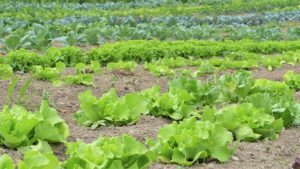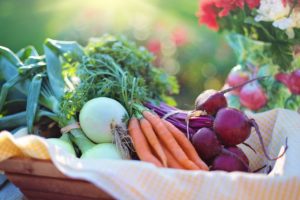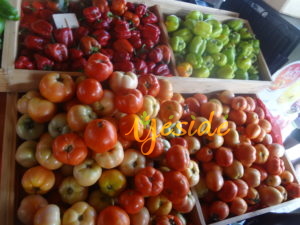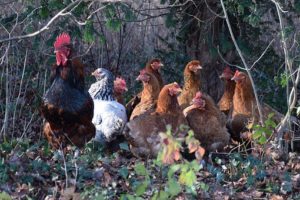
As a nutritionist passionate about indigenous foods, I encourage people to eat more of local produce especially fruits and vegetables. A key aspect of any discussion about healthy eating is food safety. How can we keep our foods safe for consumption? We are expected to clean our foods appropriately before consumption to remove dirt, germs and other extraneous materials that they contain. However, there are other deeper issues of food safety such as removing pesticides and other chemicals used to protect and preserve foods before they get to consumers.
Here is an interview with Mrs Abosede Benedict, the CEO of Grow West Africa, a Non-Governmental Organization established in 2015 to teach people how to grow food sustainably. She is an Agriculture Economist and a Farm Management Expert from Nigeria. Abosede is a certified Organic Farming Specialist trained at the Federal University of Agriculture Abeokuta, Nigeria and Conventry University UK. She volunteers at the Ghana Institute of Organic Agriculture where she trains farmers.
While she shuttles between Nigeria and Ghana to help establish large, medium and small scale organic farms, she also spends time at her own farm in Ghana practicing what she preaches. Her vision is to see that all children in Africa have access to healthy foods all year round. She also advocates for Urban dwellers to grow their own foods even in limited spaces.

BeHealthyAfrica: There have been some concerns about the way we practice farming in Africa especially with regards to the use of pesticides and other chemicals in growing our foods, preventing pest and preserving them. I know that farming practices go a long way in determining the outcomes of our foods – whether they are wholesome and safe enough for eating. What is your view about this?
Benedict: Thank you. Yes, the type of farming practices or methods one uses, determine the quality of produce that is harvested. It is because we do not carry out simple checks on produce we buy. I have bought Tomatoes from the Nigerian market and left it on the shelf in the kitchen and by the third day, I had to use all. I also got Tomatoes from a friend’s farm that uses organic methods and left it on the shelf. They spent over a week there and they were still very strong and fresh.
Another simple testing method is taste. I have eaten Cucumbers bought from the Mallams that push the wheelbarrows and it tasted so watery, tasteless, and not filling and I have tasted Cucumber grown using the organic method, they are so juicy, have a real taste of Cucumber, fleshy, and very filling.

BeHealthyAfrica: In a country like Nigeria where we buy produce from the local market without getting a certification that these foods are wholesome, what are some of the things that we can do the foods to make them safe for consumption? For instance, you once mentioned at a seminar that pesticides can get into vegetables. How do we prevent the consumption of these chemicals?
Benedict: One of the things I advocate is to eat local fruits and less imported fruits. This is because imported fruits would have more preservatives to keep them shelf stable for a while.
These days, the best way to go is to buy Organic or grow your own vegetables.
When this is not available, one way to take care of your fruits and vegetables is to soak them in vinegar. This is a good way to treat them. Ordinarily, washing your fruits and vegetables properly is a very good practice. I have seen people who buy pepper in the market and they just grind there. The people grinding just pour water into it and they remove immediately without properly using their hands to rinse them. Even at home some people do that.
For some fruits that we eat the peel, when we are not sure of the system used to grow them, it is safer to peel the skin off before eating.

BeHealthyAfrica: Asking specifically about Chicken. Chickens are given antibiotics as part of treatments on farms. Is this the appropriate way to care for chickens? I know that the debate on use of antibiotics in animals is still ongoing as there is not enough evidence that antibiotics (in animal foods) causes harm to us but obviously the overuse of these antibiotics can be a problem. The issues surrounding resistant bacteria are real.
How can we get rid of chemicals in the chicken to ensure its safe for consumption? Some people remove the skin and pour out water when they boil it the first time instead of using it as stock.
Benedict:
Chickens can be raised without antibiotics and vaccination. Herbs and different plants have been studied and used to raise chickens; this is the way to go. Ordinarily, local chickens appear to be better but still some farmers’ use antibiotics on them.
I would say that education and awareness about this method (using plants) of raising chicken need to go viral in Nigeria for people to know it is possible as an alternative way to raise poultry.
In truth, there is no way we can completely get rid of the chemicals used in rearing chickens before eating them. We can only reduce some of these chemicals when we take precautions such as boiling.
BeHealthyAfrica: For Animals that are given antibiotics, I have read that these animals can be withheld from being sold until the antibiotics clear from their systems…I can see that from your experience, your stance is obviously organic farming all the way.
BeHealthyAfrica: What’s your advice for the government concerning farming practices and food safety?
Benedict: My advice to the government is to promote Organic Farming. Let people have a reason to choose what they eat. There should be an alternative which is organic produce and consumers should be able to make a choice.
The Government should encourage an enabling environment that will make Organic production work like other countries. Support the farmers, let there be grants for organic farming also. Accept the system into law.
BeHealthyAfrica: One last advice to consumers.
Benedict: My advice to consumers is that they should grow something themselves, buy organic produce and encourage those who grow Organic produce by buying them and advertising for people.
Note: Organic Farming is a type of farming system that involves growing and nurturing agricultural crops and animals without the use of synthetic pesticides, herbicides and fertilizers. It also does not involve using genetically modified organisms, growth hormones, antibiotics and other chemicals. It produces foods that are natural and safer for consumption and also protect the environment.



Organic farming is being encouraged…..how does one deal with low yields and longer period of maturation?
Response from Mrs. Abosede Benedict:
Your soil and management practices determine your yield. Organic deals with increase in soil fertility which we believe will increase our yield on the long-run. The major problem with people is they don’t want to wait when they shift to Organic. If one is not using a virgin land, even though leaching and erosion also can occur on a virgin land, one has a waiting period to build up the fertility of the soil when one shifts to Organic farming. Organic is not the reason for long maturation. The reason starts from the seeds, and other inputs used. Also environmental factors has a role to play. How you Manage all these can determine whether farming is successfully or unsuccessful in both Organic and conventional systems.
Great I think,awareness and enlightenment is a positive way to go, a synergy with health workers, nutritionist and dietician will go along way.
I am 100% in on this one madam!
Organic all the way. Thank you for the lovely insights.
Thanks for reading. Organic farming provides a healthy alternative.
Eat healthy, eat organically produced foods. Encourage organic produce by engaging in one or patronize organic farmers today!